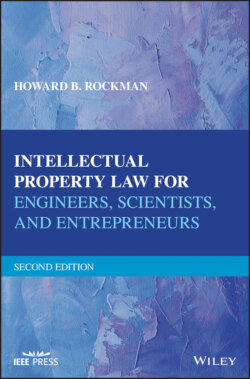Читать книгу Intellectual Property Law for Engineers, Scientists, and Entrepreneurs - Howard B. Rockman - Страница 31
2.3 DIVINE LAWS
ОглавлениеTwo codes of Divine laws are worthy of note.
The first is the Code of Hammurabi, created around 1750 BC, and it was based on the principle of an eye‐for‐an‐eye and a tooth‐for‐a‐tooth, based on one’s position in society. The early U.S. justice system was sometimes not far removed from this concept.
The Code of Hammurabi is one of several codifications of laws during ancient times. Hammurabi, the sixth Babylonian king, enacted the code, partial copies of which are engraved on a 7.5‐foot stone stele, as well as on various clay tablets discovered by modern archaeologists in 1901. The code consists of 282 laws, with variable punishments based on one’s position in society, and free man versus slave. The subjects covered in this early code include matters of contract, the terms of a transaction, the liability of a builder when a house collapses, damage to the property of another, inheritance, divorce, paternity, sexual behavior, and military service.
The preamble of the code states its purpose as:
“… to bring about the rule of righteousness in the land, to destroy the wicked and the evil‐doers; so that the strong should not harm the weak; so that I should … enlighten the land, to further the well‐being of mankind.”
The code has been cast as an early fundamental law, regulating a government in the manner of an early constitution. For example, it is one of the earliest statements of the presumption of innocence, and of the rule allowing both the accused and the accuser the opportunity to present evidence on their behalves. The most repeated law from Hammurabi’s Code is the “eye‐for‐an‐eye” provision, which states as follows:
“Ex. Law No. 196. If a man destroy the eye of another man, they shall destroy his eye. If one break a man’s bone, they shall break his bone. If one destroy the eye of a freeman or break the bone of a freeman, he shall pay one gold mina. If one destroy the eye of a man’s slave or break a bone of a man’s slave he shall pay one‐half his price.”
The second noteworthy set of Divine laws are the Ten Commandments, which are short and simple, and presumed to be known by every person. Knowledge of law is a presumption that has to be made. If not, anyone can plead ignorance of law and thereby avoid the operation of law. Today, most people can recall the Ten Commandments, or most of them; however, it would be impossible to know all of the laws which govern our lives today. However, there is a presumption under American law that every citizen is held to the knowledge of every law. Ignorance of the law is no defense to unlawful behavior in a nation which is governed by the rule of law.
